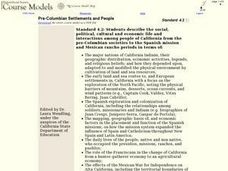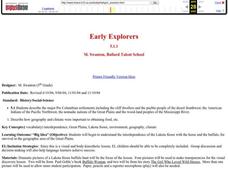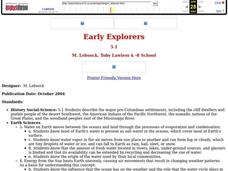Curated OER
Pre-Columbian Cultures in the Americas
Native American studies is fun, educational, and highly motivating. Fifth graders will gain a deeper understanding of the six major pre-Columbian culture areas on the North American continent. They will choose one group and conduct...
Curated OER
Pre-Columbian Settlements and People
Fourth graders describe the social, political, cultural and economic life and interactions among the people of California from the pre-Columbian societies to the Spanish mission and Mexican rancho periods.
Curated OER
Early Explorers
Fifth graders examine how the environment and climate affected Pre-Colombian settlements. For this civilization lesson, 5th graders view pictures of different Native American tribes in different places and discuss how different groups...
Curated OER
The Land and People Before Columbus
The major pre-Columbian settlements are studied in this excellente social studies lesson. Fifth graders explain how geography and climate influenced the way various nations lived and adjusted to the environment, and focus on eight...
Curated OER
The First Americans
Young scholars participate in theatre activities to study American history. In this American history and theatre lesson, students work in groups to research a specific Native American group to investigate their lifestyle. Young scholars...
Curated OER
Early Explorers
Fifth graders study early explorers. In this World history lesson, 5th graders draw an outline of a map labeling each part, build geographical features out of dough, and paint each of the land and water features.
Curated OER
What Was It Like?
Students use the Internet to gather historical facts about the county in which they live. Using the information, they discover how to check it for accuracy and present their findings to the class. They write an essay about the history of...
Curated OER
Gold Rush Abolitionists: How different was the role of Spanish-speaking blacks under Mexican rule from the role of English-speaking blacks under U.S. rule?
Students determine how Spanish-speaking blacks and English speaking blacks were treated differently. In this emancipation lesson, students compare the Mexican and American rules regarding slavery.
Curated OER
Coming to California
Fourth graders read excerpts from Juan Bautista de Anza's diaries. They analyze the impact of primary sources. They write journal entries for characters in stories they have read during the year.
Calisphere: University of California Libraries
Univ. Of California: Calisphere: Early California Exploration and Settlement
Images showing early California exploration and settlement dating from 1780s through the 1830s and describing the social, political, cultural, and economic life and interactions among pre-Columbian people of California.
PBS
Pbs: New Perspectives on the West
This in-depth resource presents a history of the American West from pre-Columbian times until World War I with profiles, documents, and images. It encourages visitors to link these into patterns of historical meaning for themselves....
Library of Congress
Loc: Online Exhibition: The Cultures and History of the Americas
Examine some of the rare books, maps, prints and other artifacts in this online exhibition. The exhibition explores several themes on the cultures and history of the Americas. The collection focuses on the period of pre-contact through...
Curated OER
Unesco: United States of America: Cahokia Mounds State Historic Site
Cahokia Mounds, some 13 km north-east of St Louis, Missouri, is the largest pre-Columbian settlement north of Mexico. It was occupied primarily during the Mississippian period (800-1400), when it covered nearly 1,600 ha and included some...













